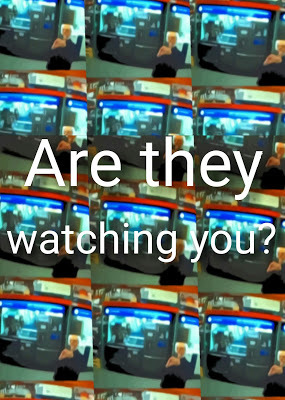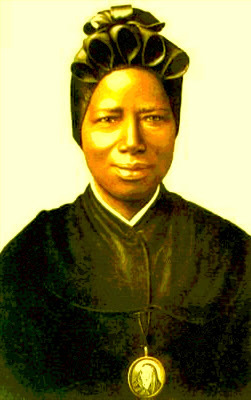John Janaro's Blog, page 130
February 19, 2020
February 17, 2020
The Political Idolatry of the Emerging New Epoch
 These distinctive times of explosive technological expansion are ushering in a "new epoch" in human history in which humans have access to unprecedented levels of material power, and must grapple with the bewildering scope of possibilities and dangers entailed by that power. Among other things, the epoch of power poses dramatic challenges for politics — it gives humanity the "tools" to construct human (or inhuman) societies which immerse and involve their members on a larger scale than anything we have seen or imagined before.
These distinctive times of explosive technological expansion are ushering in a "new epoch" in human history in which humans have access to unprecedented levels of material power, and must grapple with the bewildering scope of possibilities and dangers entailed by that power. Among other things, the epoch of power poses dramatic challenges for politics — it gives humanity the "tools" to construct human (or inhuman) societies which immerse and involve their members on a larger scale than anything we have seen or imagined before.For Christians who seek to follow the Gospel, this raises important issues regarding faith and the community within which we hold that faith. Living our faith in the context of a vital, concrete Christian community is first of all proper to our ecclesial vocation, but it also grounds our way of being in the world, and therefore has implications for our formation as mature and free persons engaging in the secular affairs of temporal human society. If faith is not incarnate in the actual lives of believers, in a communion of life through which Jesus is present to form, nourish, and hold accountable those who belong to it, the existential human need for "belonging" is left without an adequate object. History has shown (and current events continue to prove) that when Christian persons lack the experience of belonging communally to Christ (and therefore concretely to one another "in Christ" and radically to every human person), they inevitably gravitate toward some lesser commonality with a particular group and seek therein a definitive communal experience, a belonging that anchors and gives meaning to their personality, that provides an adequate measure (and limit) for their love.
Certainly there are levels of belonging and degrees of intimacy and affection that are natural to being human: the family (immediately and organically "given" as physical relation and basic, formative foundation of human communal experience), the neighborhood, the town, friendships and associations, clubs, etc., right up to the political community which concerns the temporal common good of a "people" and their homeland. All of these communal relationships are important and good, and in them we experience in different ways our flourishing as human persons and our responsibilities toward one another and the particular community as a whole. None of these communal belongings or experiences, however, fully correspond to who we are as persons or to the mysterious and entirely particular vocation of each of us to love and to be loved.
So far I have been addressing Christians. But any human person can grasp that his or her fundamental and definitive identity is rooted in and tends toward a transcendent love, a kind of belonging greater than any that can be found in this present material universe which may be vast and intricate but inevitably has limits. The person is made for a limit-less love, and will never be finally satisfied with anything less. The Infinite, however, is not something that existentially limited humans can construct for themselves. It is a Mystery they must search for and follow, a Mystery of Love that the human heart somehow senses wants to give itself.
Many people of good will sincerely seek to follow this way of love, often in a courageous and admirable manner. Others at least acknowledge that this is true, even if they don't measure up to it in their lives or are perplexed and hindered in various ways. Or they live within the heritage of one of the great religions of the world that seek transcendence, or are embarked on other particular journeys that their conscience has directed them to follow. All these people recognize that human society must have at its heart respect for the transcendence of the human person.
Perceiving this inviolable, mysteriously "given" and radically "guaranteed" basis for human dignity, they can make common cause with Christians in political action without fearing the intrusion of proselytism that would try to manipulate them, or that they are unwittingly furthering some secret Christian plan for the imposition of a "theocracy." Such tactics are unworthy of the freedom of the person, and the freedom of the Gospel. Christians are called to follow the teaching and example of Jesus, whose "kingdom is not of this world," and who always showed profound respect for human freedom even to the point of death.
Christians, of course, also deserve to have our freedom respected; we must be free to speak about our convictions and allow them to shape our political judgments regarding the good of the commonwealth. We are committed to the transcendence of the human person because we hold that human dignity is rooted in our belonging to God, who creates, redeems, and calls us to Himself; who took flesh in Jesus Christ and who remains with us in the unique communion of discipleship wherein He calls us to "love one another." This grace-given experience of belonging fills up our lives and also flows out to renew and perfect all forms of human relationships and community. It sustains our freedom. Without it, the Christian person is alone and isolated in living their faith, and becomes prey to illusions that lesser allegiances can take the place of communion with God.
If we lack an adherence and participation in the “gathering of people” (ekklesia) that Jesus consecrated to continue His transforming presence in history, our Christianity becomes abstract and “distant.” God appears to be “absent” as we face the difficulties and fragility of life. We neglect (or approach only with an empty formalism) the many ways that Jesus “accompanies” us through the communion of believers and the ministry which He has established and through which He has promised (even with all the failures of its members) to “be with us always.” With all this “empty space” that has crept into their lives, isolated Christians are tempted to adhere to anything that appears to be a plausible substitute, or to elevate lesser relationships to an "ultimate status" in the hope of finding some defining reference point in them.
 This temptation affects not only Christians. It affects every person, because everyone desires to “belong” to something that secures their identity. There are of course many ways human persons “belong” together (as I noted above). The temptation is to turn a temporary, merely-humanly-constituted community into the source of ultimate meaning and the unconditional context and exhaustive object of a person’s vocation. This aims in the direction of what the Bible calls "idolatry."
This temptation affects not only Christians. It affects every person, because everyone desires to “belong” to something that secures their identity. There are of course many ways human persons “belong” together (as I noted above). The temptation is to turn a temporary, merely-humanly-constituted community into the source of ultimate meaning and the unconditional context and exhaustive object of a person’s vocation. This aims in the direction of what the Bible calls "idolatry."It has political implications.
Historically, we have seen the destructive nature of particular important-but-limited communities that take on an "absolute" definitive status for their members. The result resembles a kind of idolatry — a kind of "divinization" of an ideology or a system, or of a nation, race, ethnic group, or tribe. And we see now the rise of "new tribes" not connected by kinship, but defined by what (or whom) they exclude, and by the pseudo-identities they generate through the images of electronic media, simplistic slogans, superficial "rituals," and other classic propaganda techniques that are accessible to everyone in this new epoch.
This kind of idolatry is casting its shadow over our times. It exists in full realization in some places in the world, while in others it lurks as a tendency, as the possible future of present unhealthy aspirations, as an inchoate or partial reality, as a danger, and — undoubtedly — as a temptation. This is not the old "hard" religiously-specified pagan idolatry of worshiping statues or personified forces of nature. It is the much more subtle new "soft idolatry" that marginalizes and effectively replaces God — the One who alone fulfills the transcendent destiny of the human person — with a merely human social or political project.
This new idolatry is subtle because its gradual but ultimately totalizing absorption of the human person spreads covertly within society like an incubating disease. It builds itself up through diverse inflammatory manifestations of social problems that often seem to contradict each other. It grows within societies when there is widespread insecurity about personal identity, weak interpersonal and communal bonds, rival ideologies, various artificially aggravated fears, rumors and confusion, negligent ignorance, cultivated superficiality, lack of civil discourse, lack of principles, reliance on pseudo-"authorities" and magnetic or manipulative personalities, pressure for cultural conformity, revenge, group-think, nostalgia, utopian dreams, excessive hopes for prosperity, for progress, for total safety from danger, for many other things (the list could go on and on) ... and — of course — the increasing (and always justified as "necessary") application of good old fashioned brute force.
It all conspires to eclipse the transcendence of human destiny, suffocate the heart of the human person, and preoccupy people with a multitude of distractions. It infects the politics of our time, which in various ways pretends in a practical sense (or sometimes pretends — which is already too much) to rule over all our thinking about the meaning of things, to fill our minds with its claim to be the highest measure of life.
The politics of the new epoch is idolatrous insofar as it aspires (even without the awareness of all who participate in it) to "deflect" the human search for transcendence and invade its space, or to use power to suppress it and take its place. It is accompanied (and "enabled") by the reduction of the scope of human desire to the empirical categories of objects-to-be-possessed, and the prevalence of practical materialism as the social norm.
In terms of depth and danger, these emerging forms of political idolatry are venturing into "uncharted territory." Politics now has at its disposal the continuing expansion of material power for everything from making things to processing and distributing information to bridging distances and gaining unprecedented dominance over space and time to enhanced forms of multi-sensory engagement through media technology.
What are the monstrous political possibilities that might emerge in the future, perhaps even the near future? Will we have the awareness and attention necessary to recognize them and the courage to resist capitulating to them?
[...to be continued]
Published on February 17, 2020 19:27
February 16, 2020
The Rhododendron is My Favorite Wintergreen
Rhododendrons, you ROCK!
Published on February 16, 2020 16:34
February 15, 2020
Human Dignity and Belonging to the Absolute

The human person realizes the maturity of his or her identity in relation to other persons, by living in communion. Various kinds of human interpersonal communion enrich the persons who give and receive love within them and also build up and strengthen the "common life" they share.
But the space of ultimate, definitive belonging for the person is sacred. It is transcendent. The person is "aware" (in some fashion, even if not explicitly articulated) that he or she "belongs," radically, to a Mystery, a Reality-of-Love-and-Affirmation that cannot be reduced to any person or group or object that is merely of this contingent, finite universe. The heart of the person cries out for the unique belonging to the Mystery that calls him or her into being, into a vocation to freedom that is inviolable, a vocation to love the One who is Absolute.
The dignity of the human person is founded on this belonging-to-the-Absolute. Any human person or community or ruler of this world who pretends to take the place of the Absolute in relation to any other person or group of persons violates their dignity. Sometimes we see this carried out in brutally obvious fashion, in an openly totalitarian dictatorship with a ritual personality cult. It happens whenever persons are reduced to the status of "things" and given over to the domination of others to use or dispose of as they wish. It happens to some degree, or casts its shadow over any human relationship insofar as it is not shaped by respect and love, but rather slips into even the most subtle forms of manipulation or abuse.
Every natural human mode of belonging has its proper place within that fundamental vocation of belonging to the One who alone establishes a person's identity, corresponds to a person's freedom, and constitutes a person's ineradicable destiny and radical fulfillment.
Published on February 15, 2020 20:54
February 14, 2020
Taking Our View “From the Heights”
Cold hearts and narrow minds can easily turn a small perspective into "a great illusion." Saint John XXIII insists that "we must take our view from the heights and courageously embrace the whole."


Published on February 14, 2020 20:00
February 13, 2020
The Politics of Loving Our Enemies
 Christians and other people who are dedicated to the transcendent and inviolable dignity of the human person in our time have very real opponents in the political and social realm.
Christians and other people who are dedicated to the transcendent and inviolable dignity of the human person in our time have very real opponents in the political and social realm.In a certain respect, we cannot help perceiving them as "enemies" even if we are determined not to judge people, but rather to focus on the good and foster it as best we can in society. Even when we try to view individual persons and their motivations in the best possible light, we cannot deny that there are people and groups who engage in or advocate some very bad things in our culture.
Indeed, we see all over our world forces trampling over the good with raw and obvious contempt for human dignity. We may try to seek justice from our current governments, but all too often these destructive forces are permitted, favored, or even unleashed by political leaders themselves.
What can we do?
We certainly cannot capitulate to being redefined by the ongoing social and cultural "revolution" fueled by the desperate alienation of our confusing times. (And it should be noted that this revolution — even as it claims victory and promulgates itself as the new measure of normality and common sense — is already breaking into fragments, engendering new forms of dissent, new factions, and new animosities.)
This makes it pretty clear that we have to regard some political leaders, groups, and cultural influencers as "enemies" — not in their humanity-as-such nor with regard to the good that is in them (and often they have very much good, and accomplish good and admirable things in certain contexts) — but only insofar as they actively promote an inhuman agenda or their own selfish whims or a pathological cult of personality as the norm for the common good in society. And even though they are "enemies" to the degree that they participate in destructive activity, we must still love them as human persons.
We cannot permit ourselves to hate — that is, to will evil precisely as evil toward any human person. Hatred is never an option for the Christian or for anyone who seeks the good with a sincere heart. But we must do more than refrain from hatred. We must love our enemies. This love is not a sentimental or emotional state, but a firm commitment of our freedom, to will what is truly good for them as persons, as brothers and sisters. We can love our enemies and still be "angry at them" because of what they are doing. But the work of cultivating agape as active love seeks to encompass all the natural human impulses and transform them into vital energies at the service of love. This is difficult work, but Christians have confidence that they will make progress in the ways of love through the One who is at work in them.
Loving our enemies is fundamental to political action, and we shall return to it again and again. Love — the commitment to the good of the person and the actions that flow from it — is the only dynamic that can generate change and true progress in the world.
We have seen the most obvious way to identify a "political enemy." But when we look to other public figures who claim to oppose some of the bad things our "enemies" want, we soon find that these would-be allies are not much better. Usually, if we're honest with ourselves, we realize that we can't trust them. They may in fact be our "enemies" in other respects that we don't yet perceive as such. They may be trying to co-opt our desire for justice and goodness into their own (ultimately violent) ideology. Or perhaps they are persons of such poor character or psychological instability that they are virtually insupportable as political custodians of the common good.
In any case, today's political game involves using the enormous power of communications media to "get inside people's heads." Political campaigns forcefully (and mendaciously) manipulate images to generate impressions (and illusions) about the office-seekers they promote and their opponents. As a result, we increasingly find ourselves at election time in a situation where all the candidates on the ballot are demagogues playing on the diverse, particular needs, fears, and overall sentiments and prejudices of their factions.
What can we do when the scramble to attain (and hold onto) public office inevitably favors politicians who are in one way or another inimical to our core convictions? We may face situations in which all candidates are likely to obfuscate, violate, or work against what we are convinced is the essential, integrally human approach to preserving and fostering the common good of a society of human persons called to live in communion.
 When it comes to politics, I think many Christians stick with the "lesser evil argument" and therefore have no political enthusiasm. They try to withdraw from association with any of the shady characters of the political class, but they will "hold their noses" when election time comes and vote one way or another, for the candidate whose victory seems to them to be the "lesser evil."
When it comes to politics, I think many Christians stick with the "lesser evil argument" and therefore have no political enthusiasm. They try to withdraw from association with any of the shady characters of the political class, but they will "hold their noses" when election time comes and vote one way or another, for the candidate whose victory seems to them to be the "lesser evil."This is an understandable strategy. But in this time of immersive, pervasive, invasive multimedia, once you pick a candidate it's harder than ever to escape the pull of partisanship, of wanting to belong to the winning tribe. Christians and other very fine people in my own country and elsewhere inevitably feel this force.
We must be aware of the influence of this pull toward factionalism, and how it can subtly manipulate our inclinations and constrict with an unwarranted narrowness the contours of our perception of political and social life. In our times, new and belligerent "tribes" are emerging, united by common orientations of sentimentality, desire, fear, and unconsidered impulses and aspirations driven by images of a violent "victory" over dehumanized "enemies."
If we allow the impulses of the new tribalism to take over within us, it will become harder and harder to recognize our political enemies as human persons worthy of love. And if we forget to love them, we will be drawn into an arrogant, dismissive hostility toward them. We will begin to hate them.
We must guard ourselves against these things. We must remember who we are. We must pray, humble ourselves before the Lord, and beg that in politics as in all things we might be grounded in the merciful and loving heart of Jesus.
Published on February 13, 2020 16:22
February 11, 2020
"World Day of Prayer for the Sick."
I cast this text for today's "World Day of Prayer for the Sick" in two different color schemes. Perhaps neither of them really works all that well, though I am inclined to prefer the second one.


In any case, the words of Pope Francis for this feast day of Our Lady of Lourdes mean a lot to me. As someone who remains one of "the sick" (a fact that still hinders certain aspects of my life), I am grateful to be reminded again of "that gaze into the heart of each person" full of healing and "tender love."
Jesus "embraces people in their entirety" by becoming our brother, which entails also the precious gift he shares with us of his Mother Mary who becomes our companion with all her maternal solicitude.
The motherhood of Mary brings the real humanity of Jesus "close to us," and she remains faithfully with us - as she did with him - in all our sorrows and pain.
Our Lady of Lourdes, pray for us.



In any case, the words of Pope Francis for this feast day of Our Lady of Lourdes mean a lot to me. As someone who remains one of "the sick" (a fact that still hinders certain aspects of my life), I am grateful to be reminded again of "that gaze into the heart of each person" full of healing and "tender love."
Jesus "embraces people in their entirety" by becoming our brother, which entails also the precious gift he shares with us of his Mother Mary who becomes our companion with all her maternal solicitude.
The motherhood of Mary brings the real humanity of Jesus "close to us," and she remains faithfully with us - as she did with him - in all our sorrows and pain.
Our Lady of Lourdes, pray for us.

Published on February 11, 2020 20:33
February 10, 2020
Christina Grimmie's Great Affection For Life
 There are good reasons why I have marked this day every month for the past three and a half years through some form or mode of engagement with the life and legacy of Christina Grimmie.
There are good reasons why I have marked this day every month for the past three and a half years through some form or mode of engagement with the life and legacy of Christina Grimmie.This is not simply an exercise in personal nostalgia. Indeed, I didn’t have much familiarity with her prior to June 2016.
I have been a musician for nearly 50 years, and avid appreciator of a wide spectrum of music for as long as I can remember. And though I was forced by health problems to step back from classroom teaching, I remain active as a university professor through writing and research on — among other things — the task of understanding the nature, impact, and pedagogical potential of “new” communications media.
By the middle of the last decade, I had seen quite a bit of the range of creativity and personal engagement taking place on YouTube and Instagram. Meanwhile, Christina’s stunning breakout on The Voice before millions of viewers on mainstream broadcast television could hardly fail to draw the attention of music people, even people like me who were not especially tuned in to the styles of pop music that the kids were listening to.
When I heard about Christina Grimmie's tragic and astonishing death I was shocked and deeply sorry. I started to give special attention to the YouTube videos of the small girl with the huge voice who had amazed everyone in 2014 and had been so suddenly, inexplicably taken from us less than two years later.
That was when I began to see that her achievements as a singer, a musician, and a "presence" in the emerging environments of digital interactive media were beyond any ordinary measure. I was struck by the depth and commitment of her faith in Jesus Christ, but with time I realized more and more how pervasive that faith was "within" everything she did.
She didn't hide her faith, but she spoke of it with simple directness, and not all the time — indeed, not very often — but in a timely fashion, in those moments when it was "necessary" to "use words." Otherwise, she carried out a vigorous engagement of her music and many other interests with a vitality and affection that were so evidently human, and at the same time so 'different' — in a way that was fascinating and provoking.
People found that they wanted to respond to her immense affection, in which her whole life was invested with joy, spontaneity, gratitude, positivity, sincerity, hope, and humor; a great embrace that she opened up to everyone and invited them to share, always with tremendous respect for their freedom and their own particular personal gifts.
I never met Christina in this world. I wish I had. Still, I have found that her luminous life is a gift to me. Her humble, courageous, confident living of her faith in the midst of a difficult and often discouraging world is a sign for me that I have come to cherish.
I never expected to find anything like this on YouTube, or in 2010s popular music. It's easy to grow cynical, to forget, to assume we have nothing new to discover in life. Yet it always remains possible to be surprised. I return to Christina's legacy at least once a month (often in the midst of many other preoccupations) and I find myself surprised all over again.
She helps me to remember to continue to hope, to persevere even when I feel helpless, to grow in the conviction that in the mystery of life (and no matter how it may appear to our narrow vision of a given moment) evil does not have the last word.
Published on February 10, 2020 20:04
February 9, 2020
"Then Light Shall Rise For You..."

Share your bread with the hungry,
shelter the oppressed and the homeless;
clothe the naked when you see them,
and do not turn your back on your own.
Then you shall call, and the Lord will answer,
you shall cry for help, and he will say: Here I am!
If you remove from your midst
oppression, false accusation and malicious speech;
if you bestow your bread on the hungry
and satisfy the afflicted;
then light shall rise for you in the darkness,
and the gloom shall become for you like midday.
~Isaiah 58:7, 9-10
Published on February 09, 2020 20:36
February 8, 2020
The Witness of Saint Josephine Bakhita
 Today we celebrate a woman who was empowered by the love of God, and who gives hope to all powerless women, abused women, trafficked women - to oppressed women and men throughout the world.
Today we celebrate a woman who was empowered by the love of God, and who gives hope to all powerless women, abused women, trafficked women - to oppressed women and men throughout the world. She was abducted from her African village and native people of South Sudan in the latter half of the 19th century. She never remembered her birth name, but the Arab slave traders had called her "Bakhita," which means "lucky."
There was nothing that looked lucky about the horrible abuse and mutilation that she suffered for years as a slave in Northern Sudan, but then she was brought to Italy, found Christ, and was baptized Giuseppina Fortunata ("lucky"). She became a religious sister and for 40 years worked at the convent and among the people simply but with profound charity. She not only forgave her oppressors, but said she would kiss their hands if she saw them, because they brought her to Jesus.
Jesus overcame evil with good, hatred and violence with the love beyond all measure, the love of God poured out and given to free us from sin, to free us to share in eternal life - to attain the joy for which every human person was made.
Jesus gave Bakhita her true freedom, and formed within her a heart overflowing with mercy and compassion.
Saint Josephine Bakhita, you have a lot to pray for. We need you. Pray for an end to violence, human trafficking, and child abuse. Pray for South Sudan, for those suffering persecutions, hunger, the ravages of war in Africa and through the world, for an end to all forms of slavery, for respect for the dignity and beauty of every woman and every man, for the perseverence to never give up searching for God's will, and trusting in him when he shows us the way. Pray for us, that we might love and forgive our enemies out of the conviction that God loves us and them, and orders everything in his wisdom and mercy to the good.
Published on February 08, 2020 15:54



